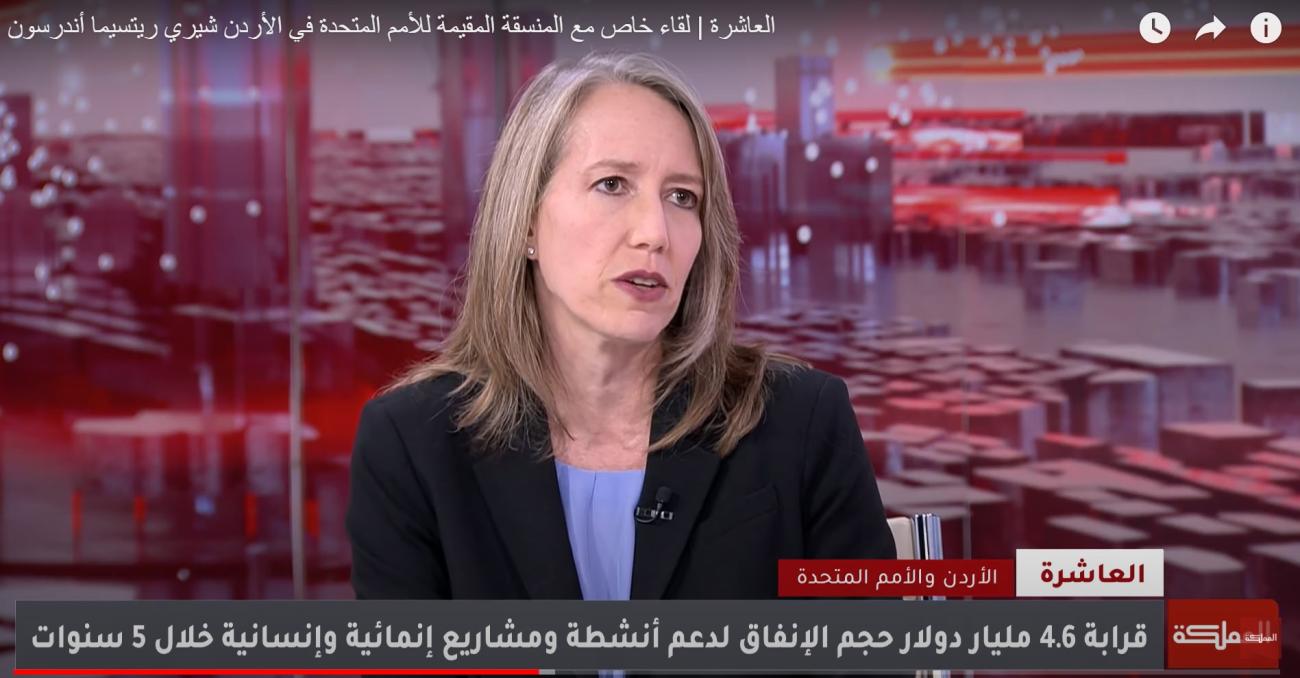In an exclusive interview with Al Mamlaka TV

UN Resident Coordinator in Jordan expresses support for Jordan’s development priorities; calls for increased support for WFP and UNRWA programs.
Summary of the interview
In an exclusive interview with Al Mamlaka TV on 18 July, Sheri Ritsema-Anderson, the UN Resident Coordinator in Jordan, emphasized the enduring partnership between the UN and the Government of Jordan.
During the period of implementation for the UN Development Sustainable Framework for 2018-2022, she said, the UN successfully implemented diverse programs and initiatives valued at approximately $4.6 billion, with $1 billion spent in 2022. These programs, encompassing both humanitarian and developmental efforts, resulted in significant advancements in three key areas: strengthening institutions, empowering individuals, and enhancing opportunities, she explained.
Some of the key achievements the UN has contributed to include the establishment of the Kingdom’s first ever Artificial Intelligence Strategy, Urban Policy, and Social Protection Strategy; promotion of compliance with international labour standards in the garment sector, supporting Jordan to retain preferential access to EU and US markets; and the development and implementation of plans to conserve cultural heritage. The UN has also supported the delivery of basic services, such as health care and education, helping more than 56,000 children overcome the learning they lost during COVID and supporting the Ministry of Education in assessing nearly 1 million students on their Arabic and maths levels.
Despite the remarkable progress achieved in the past five years, Ritsema-Anderson acknowledged that Jordan continues to encounter challenges in its pursuit of the Sustainable Development Goals (SDGs), similar to other countries. She noted that across the world, progress is significantly off track. She highlighted the critical areas of concern, as stated in the Government of Jordan’s Voluntary National Report presented at the UN in 2022, include addressing inequalities, promoting economic growth, and creating decent work opportunities, as evident in unemployment statistics.
Looking ahead, the UN, she added that the UN is actively collaborating with the Jordanian government to finalize the "UN Cooperation Framework 2023-2027." This agreement places a strong emphasis on inclusive green growth, decent work, social protection, quality basic services, sustainable management of water, food, and energy, as well as public sector accountability, transparency, and participation. “However, the projected budget for UN projects in the next five years is currently estimated at $3 billion, however, this is an early estimate, and we hope to see this expand” during implementation of the framework.
Speaking about Agenda 2030 and its 17 SDGs, Ritsema-Anderson cautioned that the SDGs face significant risks. As member states convene at the High-Level Political Forum in New York to devise a rescue plan, the impact of COVID-19 and various global and regional crises have hindered progress towards the SDGs. Citing the recent UN report by the Secretary General, it is projected that 575 million people will remain trapped in extreme poverty and 84 million children will be out of school by 2030, with the world's poorest populations being most affected. Hunger has returned to levels not seen since 2005 and it will take 300 years to reach gender equality at the current pace.
Expressing concern over funding challenges in Jordan, particularly for UNRWA and WFP refugee programs, Ritsema-Anderson underscored the pressing need to sustain essential services for Syrian and Palestine refugees. She stressed that UNRWA urgently requires $200 million to continue its critical work across all five areas of operations, having grappled with chronic underfunding for the past decade. Additionally, the WFP's recent announcements of a reduction in assistance for Syrian refugees in Jordan due to unprecedented funding shortfalls are deeply concerning and threaten the good work done by Jordan, the UN and donors together over the past 12 years. To avoid even further reductions in food assistance, WFP urgently needs to receive $41 million, which will cover unmet requirements until the end of 2023. Ritsema-Anderson called for continued financial support to provide hope and refuge for refugees in Jordan.
Regarding the return of Syrian refugees to their home country, Ritsema-Anderson noted that international principles require returns to be voluntary, safe and dignified. She explained the UN looks to whether these are in place when considering possibility of returns. She affirmed that the UN Special Envoy for Syria has publicly welcomed efforts by relevant parties to find solutions for the Syrian crisis, in line with UN resolutions. In addition, the UN facilitated the resettlement of a few thousand refugees in Jordan to third countries in 2022, an increase from 2021. She emphasized the need for countries to work with each other and agree amongst themselves how they can each best support refugees worldwide, in alignment with international law, the Global Compact on Refugees, and the New York Declaration for Refugees and Migrants, and guided by the UN High Commissioner for Refugees (UNHCR). The Global Refugee Forum scheduled for December 2023 offers a unique opportunity for this inter-nation discussion to occur.














